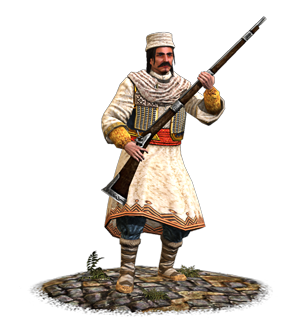Difference between revisions of "Haydut Irregulars (ETW Unit)"
Tango12345 (talk | contribs) m (Removed category "Empire Total War Units"; Quick-adding category "ETW Units" (using HotCat)) |
|||
| Line 33: | Line 33: | ||
*[[Image:Ottoman_flag.jpg|25px]] [[Ottoman Empire (ETW Faction) |Ottoman Empire]] | *[[Image:Ottoman_flag.jpg|25px]] [[Ottoman Empire (ETW Faction) |Ottoman Empire]] | ||
| − | |||
[[Category:ETW Infantry]] | [[Category:ETW Infantry]] | ||
| + | [[Category:ETW Units]] | ||
Latest revision as of 10:06, 30 May 2017
![]() These irregulars have the field skills needed to survive in the mountains, and all the cunning of bandits.
These irregulars have the field skills needed to survive in the mountains, and all the cunning of bandits.
Overview
Haydut Regulars are extremely good at using ground cover and can hide in almost any terrain, as might be expected of brigands or bandits. They are however, not suited to combat against cavalrymen, as they have no formal military training. They do not wear armor as this would slow them down if they needed to run away.
In the Balkans a haydut (The Turkish version of the word) or Hajduk, was a Muslim or Christian bandit, but one who stole mostly from the Ottoman overlords, led his fellows in fighting injustice, and robbed the rich to give to the poor. All this is very romantic, but not entirely accurate. The Hayduts were bandits, but they did not always fight against the Ottomans. For the right money, they could also be persuaded to fight for the Sultan. Like bandits everywhere, their equipment and uniforms were taken from their victims, so it was not uncommon to see Hayduts using Austrian as well as Turkish gear.
Details
Hayduts are an elite irregular unit recruit able only from the Balkans and available only to the Ottoman Empire. Haydut Irregulars should be used like skirmishers: to harass the enemy lines and combat any enemy skirmishers. Due to their accuracy they can be expected to outclass any other irregular or equally equipped skirmisher unit. They are also able to handle themselves well in melee against equally equipped infantry, however they are vulnerable to attacks from cavalry.
